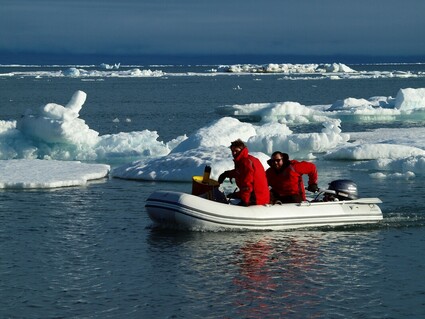Listening to a Changing Arctic

Addressing impacts from shipping and climate change in the western Arctic
Climate change is impacting northern areas at a much faster rate than areas further south. WCS Canada’s Arctic research team is studying how a changing climate could affect marine ecosystems in the western Arctic. Our area of focus is the eastern Beaufort Sea in the Inuvialuit Settlement Region (ISR) covering an area of approximately 435,000 km^2. Of particular concern is a likely increase in marine shipping traffic through the region with the retreat of summer sea ice, which could lead to direct and indirect impacts on marine mammals. We are also monitoring how marine mammal food sources may be changed by warming waters, among other climate impacts. This work is being carried out in cooperation with Inuvialuit communities and we are using our research to provide guidance and recommendations on marine mammal conservation to local communities, co-management institutions and other decision-makers.
Climate change is impacting northern areas at a much faster rate than areas further south. WCS Canada’s Arctic research team is studying how a changing climate could affect marine ecosystems in the western Arctic. Our area of focus is the eastern Beaufort Sea in the Inuvialuit Settlement Region (ISR) covering an area of approximately 435,000 km^2. Of particular concern is a likely increase in marine shipping traffic through the region with the retreat of summer sea ice, which could lead to direct and indirect impacts on marine mammals. We are also monitoring how marine mammal food sources may be changed by warming waters, among other climate impacts. This work is being carried out in cooperation with Inuvialuit communities and we are using our research to provide guidance and recommendations on marine mammal conservation to local communities, co-management institutions and other decision-makers.

A changing soundscape
The loss of sea ice due to climate change will lead to increased vessel traffic in the Northwest Passage, which could impact the marine environment in a number of ways. Sound is vital to the survival of marine mammals and other species, but increased vessel traffic will lead to increased noise pollution. We use acoustic monitoring (see map of monitoring sites below) to collect information on natural underwater sound levels, species presence and vocal behaviours, and the impacts of vessel noise. Our work to date includes:
Our work on noise can help inform the Inuvialuit people, government agencies, and co-management institutions about potential conservation challenges and help them make better wildlife management decisions. The focal species in our research are part of the wild food systems that are essential to Inuvialuit food sovereignty in the Arctic, a key component of the Inuvialuit Final Agreement that must be carefully considered in light of climate change and industrial development.
The loss of sea ice due to climate change will lead to increased vessel traffic in the Northwest Passage, which could impact the marine environment in a number of ways. Sound is vital to the survival of marine mammals and other species, but increased vessel traffic will lead to increased noise pollution. We use acoustic monitoring (see map of monitoring sites below) to collect information on natural underwater sound levels, species presence and vocal behaviours, and the impacts of vessel noise. Our work to date includes:
- Collaborating with ISR communities and DFO to document how quiet the current underwater environment is as well as how sound levels change with wind and ice cover, and also measuring underwater noise from ships.
- Monitoring vocalizations to document the occurrence of key species, including beluga and bowhead whales, ringed and bearded seals and Arctic cod.
- Modeling the “noise footprint” of ships, particularly in proposed shipping corridors, marine protected areas (MPAs), and core use areas of marine mammals, to assess noise impacts on marine mammal behaviour.
- Providing specific recommendations to the Inuvialuit and other decision-makers on noise impacts to improve the location, design and management of marine shipping corridors, MPAs, and other conservation areas.
- Collaborating with ISR communities and DFO to establish additional sites for monitoring (e.g., more remote areas) and map sensitive areas and seasonal activities for marine mammals such as bowhead whales, beluga whales, and Arctic cod.
- Working with Transport Canada, ISR communities, and other decision-makers to develop policies and legislation around shipping in the Arctic.
Our work on noise can help inform the Inuvialuit people, government agencies, and co-management institutions about potential conservation challenges and help them make better wildlife management decisions. The focal species in our research are part of the wild food systems that are essential to Inuvialuit food sovereignty in the Arctic, a key component of the Inuvialuit Final Agreement that must be carefully considered in light of climate change and industrial development.

Get in touch! Stephen Insley ([email protected]) and William Halliday ([email protected]).
Check out our publications here, which includes links to the published papers, PDFs of the papers when available, plain language summaries, and any other supporting information.
We have been conducting acoustic monitoring in the ISR since 2014, starting with a site near Sachs Harbour, and have since expanded to Ulukhaktok and remote areas between Banks and Victoria Island and along the mainland coast in the southern Amundsen Gulf and at Herschel Island (yellow dots on above map). We hope to expand our monitoring even farther north into Viscount Melville Sound, M'Clure Strait, and eastern Beaufort Sea. We have also been collaborating with DFO to analyze acoustic data that DFO has collected in the Mackenzie River Estuary.
|
We stand for wildlife
www.wcscanada.org |
Proudly powered by Weebly
|


